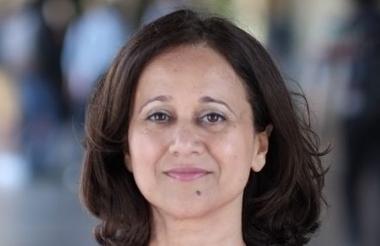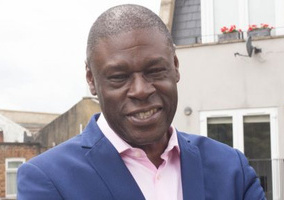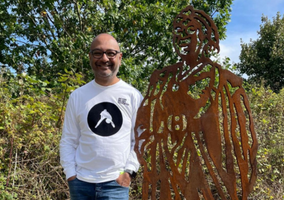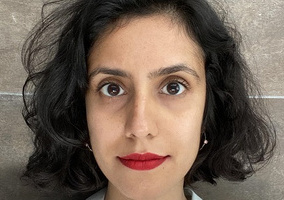Yasmin Halima, executive director of the Joint Council for the Welfare of Immigrants (JCWI), started working at 16 years old in a technical library to help out her family financially.
After moving to the UK aged six, she grew up in an Indian-Muslim family in a mill town in the Midlands, where her family made a living through manual labour.
Coming from an immigrant household, Halima and her family lived in some of the poorest housing, she says, but they were proud of their honest way of living.
“My father used to say: ‘You should be proud to pay your taxes. It means you’re a citizen.’ So we work hard, we contribute and we do the work that other people don’t want to do.”
Back to school
Working as a book keeper in a textile factory in her early 20s and as a single, young mother of a little girl, Halima realised that she lacked social, financial and educational capital. She wanted a better future for her daughter, then six years old, so she attended university to gain some qualifications.
Halima’s first job out of university was as a researcher for the Department of Health. She later worked for Brent Council in north London before joining the NAZ Project, a small charity that cares for people from Black and minority ethnic communities who are living with HIV.
Her interest in global health took her to the US, where she did postgraduate studies and later worked for about 18 years.
Asked how she managed to raise a child while juggling her classes and later her career, Halima says: “Women do it all the time.”
In 2022, Halima returned to the UK to be with her family. Initially, she approached JCWI for a voluntary role because she had once worked with the charity on women refugees escaping violence. JCWI had also helped a member of her family as a service user 30 years ago.
But as part of JCWI policy, it does not take on unpaid volunteers. However, Halima discovered that JCWI was recruiting an executive director as it had an interim leader at the time. So she applied and joined the charity in January last year.
Setting a precedent
The goals Halima set for herself as JCWI’s executive director were stability, sustainability and making an impact – just like any other leadership role she would have stepped into, she says.
“We do good work, but the good work has to show impact,” she says.
JCWI’s work includes strategic litigation, in which it takes on complex legal cases with people experiencing mental health challenges, detention, fleeing torture and persecution.
“Those are the kinds of cases we take on. We do that in order to make changes that hopefully will have an impact not just on our clients but on others who come after that. So that’s a lot of hard work.”
One of the most challenging areas of JCWI’s work is their effort in legal aid, Halima says, as legal aid work is poorly paid and difficult to claim back.
“The legal aid system by design is so onerous, and we’re constantly behind,” she says.
“Not many people do legal aid anymore. They provide legal advice up to a certain level but maybe not at the level that we do.
“And we struggle to do that, but we do it because we feel that it’s absolutely needed and vital to those who really need to seek justice. How else are people going to have access to justice if they can’t access legal aid?”
Around the time when Halima joined JCWI, there were a series of policy changes in parliament aimed at deterring people from seeking asylum in the UK including the Rwanda bill.
Halima says the previous Conservative-led government was getting more draconian and less open to dialogue.
“We saw a government that was just very closed in their thinking and everything was built around a rhetoric that was about deterrence when we know, just based on evidence, that the numbers of people who come go up and down, deterrents don’t make that difference.
“If people aren’t allowed asylum and aren’t allowed safe ways to come, then they are going to see even more and more desperate measures. And that’s what we’ve seen, people getting into these boats that clearly are not going to sustain the journey.”
JCWI had clients who were on the Rwanda deportation list days before the scheme was canceled by the Labour government, she says.
Even now under a Labour government, Halima says JCWI still works in a hostile environment regardless because it’s “very much built into the system”.
“When we put evidence forward, there is a culture of disbelief that we have to argue against and fight against legally,” she says.
Nevertheless, Halima hopes that there will be more open and positive dialogues with the Labour government, especially after the riots across the UK last summer.
‘Some immigrants are called out more than others’
JCWI was on the frontline when the riots happened last summer. It had clients who are asylum seekers and were expected to go for their interviews with the Home Office, which JCWI staff had helped to reschedule because of the riots.
At one point, the charity shut down its office for fear of being attacked. It allowed more flexibility for staff to work remotely so that no one put themselves at risk.
Many of the JCWI staff are first or second-generation children of immigrants who would have been targeted too, she says.
The riots also triggered Halima’s memory when the British National Party and the National Front marched down her street when she was a child.
“I was very frightened and confused because I came to England when I was six. So, I know no other world than being here — being British, Indian, Muslim, and now I’m told to go back. And I think: ‘Go back where? To what?’
“Britain is a country made up of immigrants, but some immigrants are called out more than others.”
The word immigrant has a pejorative definition when it is people from certain countries or origins, she says.
Immigrants have been used as scapegoats to distract the public from pending issues like health care and education, she says, while politicians also used immigrants as a tool to gain votes during elections.
“That’s really not the right way. It really should be about looking after people, rather than focusing on borders and locking people out.
“It should be about justice. It should be about care. It should be about all the people who need support. And certainly, when it comes to those most vulnerable in our society.
“It’s important that we think of them not through an immigrant frame, but just as people, just human beings.”
‘We take on the fight that is the hardest’
One year into her role, Halima says being a part of the JCWI movement is one of the proudest things for her.
“What I love most about JCWI is that we take on the fight that is the hardest, and we fight for those who are least likely to have a voice.
“We help those who come with the greatest need.”
The government often listens to the same people, she says. Halima hopes to have more equitable listening sessions with the government and for more voices of people from grassroots communities to be heard.
As she reflects on her career, she says: “JCWI gave me an opportunity, knowing my history, my background, my competencies and my experience, but also knowing me in my journey.
“They gave me this opportunity says something not just about me, but it says something about JCWI and its leadership that they appointed someone like me.”
Related articles












